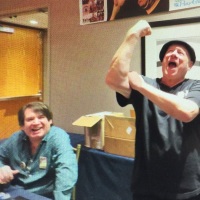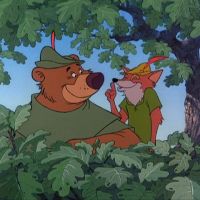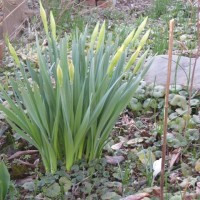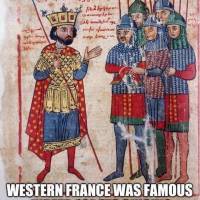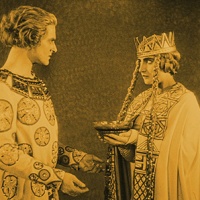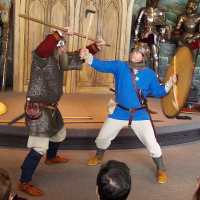Between the publication of Philip Pullman’s Fairy Tales from the Brothers Grimm: A New English Version and Maria Tartar’s The Annotated Brothers Grimm, there is some new discussion on the darker materials (sorry, couldn’t resist that one!) found in these classic tales, so I thought I’d take a look at some Child Ballads from England to hear some of the stories English kids were being told and compare them to their German counterparts and wouldn’t you know it – I found an especially violent scene from a Robin Hood story. Well, December escaped an installment of Today’s Medieval Bloodfest – I only wish I could say the same for Guy of Gisborne…
This installment of Today’s Medieval Bloodfest comes from a child ballad about Robin Hood called, “Robin Hood and Guy of Gisborne.” It survives as a mid 17th century manuscript (Thomas Percy Collection, British Library, Additional Manuscript 27879) but a similar plot survives from a play dated 1475.[1] Since we can’t say for certain how long this particular version of the song has been around, let’s just say the scene is 15th century…
The language looks almost like it’s deliberately trying to look old fashioned and still be clearly understood. Twinn for twain, for example – and the extra e’s on so, go, and he to make them soe, goe, and hee give it a “Jolly Ole English” look and sound. I could be wrong – anyone out there with experience in 15-17th century colloquial English can tell if this poem is trying to emulate Middle English?
In any case, let’s get on with the gore!
So, Robin Hood and Little John are hanging around drinking Thunderbird and shooting craps when, would you know it, Guy of Gisborne comes along. This tasty fellow’s looking for none other than Robin Hood, that famous outlaw the peasants and guttersnipes “phone up” whenever they need some “wealth distribution.”[2] The irony of it is Guy’s found the guy he was looking for. The boys all have a short archery competition which Guy loses terribly. To save face with these expert woodsmen, he pokes fun at his uselessness with the bow by saying things like, “Whoa, I’ll bet you’re a better shot than Robin Hood!”
This corrupt cop, Guy of Gisborne, probably thinks he can make friends with these woodsmen and have some new marksmen – or at least forest informants – on Prince John’s payroll. He’s wrong. Dead wrong.

Earl of Huntington (Robin Hood – played by Douglas Fairbanks) helps Guy of Gisbourne up after defeating him in a joust in Robin Hood (1922) – this courtesy is a far cry from the Robin Hood of Child Ballad 118 “Robin Hood and Guy of Gisborne”
So he asks Robin and Little John to tell him about themselves – you know, who they are. Robin tells Guy that they’ll tell him who they are after they learn who he is. Since Guy’s sort of on their turf, he obliges them and introduces himself first – and boy was he sorry he did, because, with a sadistic smile:
Robin pulled forth an Irish kniffe,
And nicked Sir Guy in the face,
That hee was never on a woman borne
Cold tell who Sir Guye was. (verse 42)[3]
Robin chopped Guy’s face up so bad that no one – not even his own mother – would recognize him. The language downplays the violence by using the word “nicked” like it was a slight slip of the razor during a shave. The English are masters of understatement.
Poor Guy basically begs Robin to accept a ransom – any amount – in return for his release, but that’s not Robin’s style. Guy doesn’t understand why Robin wouldn’t want to become rich. In addition to not being able to understand Robin’s motive, imagine his horror while he tries to reason with his captor:
“Thou art a madman,” said the shiriffe,
“Thou sholdest have had a knights fee;
Seeing thy asking [hath] beene soe bad,
Well granted it shall be.” (verse 51)[4]
They turn their captive loose and as he’s running for his life, if only just to prove that Guy’s bow isn’t defective, Robin hands it to Little John so he won’t miss out on a little target practice with their new acquaintance:
But he cold neither soe fast goe,
Nor away soe fast runn,
But Litle John, with an arrow broade,
Did cleave his heart in twinn. (verse 58)[5]
Little John’s swift shot is so precise and powerful that it slices Guy of Gisborne’s heart in two!
I wonder how Robin Hood and Little John spent the rest of their day…
For another installment of Today’s Medieval Bloodfest, click here.
[1] “Robin Hood and Guy of Gisborne: Introduction”, Robin Hood and Other Outlaw Tales, ed. Stephen Knight and Thomas H. Ohlgren (Kalamazoo, 1997). Available online: http://www.lib.rochester.edu/camelot/teams/guyint.htm
[2] The Clash, “White Man in Hammersmith Palais” (CBS, 1978).
[3] “Robin Hood and the Guy of Gisborne”, Tradtional British Ballads, ed. Bartlett Jere Whiting (New York, 1955), 98.
[4] Traditional British Ballads, 99.
[5] Traditional British Ballads, 100.

